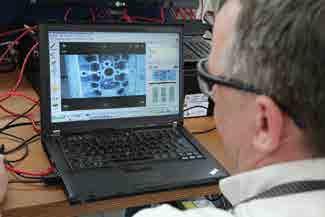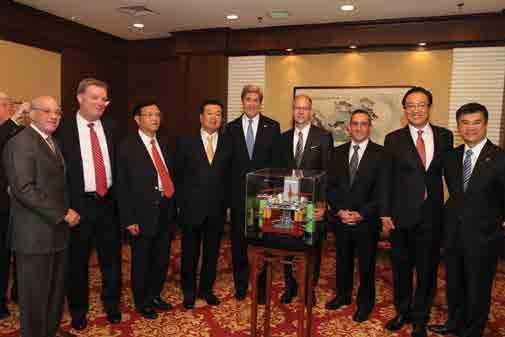
8 minute read
Technology spotlight Advances in technology
NEWS
TECHNOLOGYSPOTLIGHT
Advances in technology across industry
Putting ‘smart mobility’ into maintenance and repairs
Scientists from IBM have revealed a mobile maintenance, repair and operations (MRO) prototype which is designed to help manufacturers and companies supplying and maintaining high-value machinery in sectors such as aerospace, oil & gas and shipping.
The mobile system, using a combination of augmented reality and robotics, will help field engineers accurately locate equipment, provide them with critical information and receive real-time visual support from supervising experts based remotely.
A remote expert is able to view the on-site engineer’s workspace and support them with real-time video and audio links using a camera and a small projector mounted at the end of a remotely controlled robotic arm. The expert, from his management console, is also able to project a pointer and valuable information such as free-hand sketches, assembly instructions and CAD images directly onto the workspace or a nearby wall. Visit: www.ibm.com
Redefining the kilogram

Energy from the oceans
METTLER TOLEDO has developed a new microgram load cell for use in an experiment aimed at establishing a new definition of the kilogram. The kilogram is the last unit of the International System of Units (SI) still based on an artifact – the international prototype of the kilogram (IPK), kept at the Bureau International des Poids et Mesures (BIPM). Mass comparisons with the IPK have indicated a mean drift in the official IPK copies of 0.5 µg/year. To get better stability, scientists have been working on a new definition of the kilogram based on a physical constant of nature, which should be reproducible regardless of geographical location. The new load cell is a critical element in the Swiss based leg of this global challenge headed by the Swiss Federal Office of Metrology (METAS).
In a 15-year project, METAS has been using a Watt balance in a twophase experiment: weighing and moving. In the weighing phase, a macroscopic mass and a coil are suspended from a balance with the coil placed in a magnetic field. Using the principle of electromagnetic force restoration, the current needed to compensate for the addition of the weight is measured. In the moving phase, a voltage is induced in the same coil by moving it vertically within the same magnetic field. The voltage measured is directly related to the speed of the movement of the coil. By comparing the two experiments, an equation is derived in which the electrical power is related to the mechanical power, hence the name Watt balance. Collaborative partners in the project include the Federal Institute of Technology in Lausanne (EPFL) for the movement system, the European Organisation for Nuclear Research (CERN) for the magnetic system and METTLER TOLEDO for their expertise in mass comparison. Visit: www.mt.com Lockheed Martin has announced that it is working with Reignwood Group to develop an Ocean Thermal Energy Conversion (OTEC) pilot power plant off the coast of southern China. The 10-megawatt offshore plant, to be designed by Lockheed Martin, will be the largest OTEC project developed to date, supplying 100% of the power needed for a green resort to be built by Reignwood Group.
OTEC takes the natural temperature difference found in the ocean in tropical regions and uses it to create power. This technology is well-suited to island and coastal communities where energy transportation costs typically make other sources of power very expensive. The process provides a native power source to areas, and, like other renewable energy technologies, OTEC plants will be clean, sustainable and powered by free fuel.
Unlike other renewable energy technologies, this power is also base load, meaning it can be produced consistently 24 hours a day, 365 days a year. A commercial-scale OTEC plant will have the capability to power a small city. Visit: www.lockheedmartin.com


EURO-REPORT
FOCUS ON... France

Ian Sparks reports from Paris on French bitterness over de-industrialisation.
Kill Lakshmi Mittal! This is the goal of a new French video game which symbolises the militancy of France’s unions that many blame for the decline of the country’s once mighty industrial sector.
In the online game, players hurl barrels and rocks at police outside the loss-making steel blast furnaces in Florange, eastern France, which the Indian tycoon closed down. The British-based billionaire himself appears in the game as a robot who must be bludgeoned to death, as a text on the screen reads: “The year is 2030. Mittal has closed the majority of steel factories worldwide, tossing out thousands of steelworkers. For these men tired of unfulfilled promises and repeated closures, when all mediation has failed, there is just one solution: Kill Mittal.”
Once the Mittal robot is defeated, however, the game finally reminds the player that although Mittal has been killed, he will quickly be replaced by someone similar.
The Mittal row began in December when the boss of the Arcelor Mittal steel conglomerate announced he was axing 630 jobs at the Florange plant, blaming lack of demand from the vehicle industry. When President Hollande threatened to nationalise the factory, Mr Mittal called his bluff by threatening to close down all his operations in France, where his company employs 20,000 people.
A deal was finally struck where Mr Mittal could close down two blast furnaces in Florange as long as he promised to find new jobs for the redundant workers – but it ended with France’s industry minister Arnaud Montebourg announcing on live TV: “I have to tell you that Lakshmi Mittal is using blackmail and lies. Quite simply, we don’t want him in France any more.”
The video game’s creator Alexandre Grilletta has insisted it is simply a ‘bit of fun’ with the right ingredients of heroes and baddies that make a good game. But many in France see it as epitomising France’s unrealistic approach to work, where unions will continue to demand short working hours and lavish pensions as their companies’ profits plunge.
And it is Mr Montebourg’s bristling attitude to hard-nosed foreign investors which is being blamed for the current socialist government’s failure to revive France’s dwindling industrial base.
Only a month after the Mittal drama, another spat erupted between Montebourg and Maurice Taylor, the boss of US tyre giant Titan, who announced he was refusing to buy a Goodyear plant in northern France because the workers were ‘lazy, overpaid and talk too much’.
In a letter sent out to French newspapers, Mr Taylor wrote: “They get one hour for breaks and lunch, talk for three hours and work for three. I told the French union workers this to their faces. They told me that’s the French way!”
Furious Mr Montebourg hit back with his own letter, telling Mr Taylor his comments were ‘extremist and insulting’ and that he knew nothing about France – but the Goodyear plant in Amiens is now set to close with the loss of more than 1000 jobs. French daily Le Figaro wrote: “Mr Montebourg’s spats with international companies are making France look like an increasingly unappealing place to do business. Perhaps, in fairness to Montebourg, he is not so much the problem, but the symbol of it. Quite simply, it costs bosses too much to hire workers that make things that cost too little.”
Too late?
Fears over the stagnation of France’s economy come as the latest figures show the country’s economy had no growth in 2012 and shrank by 0.8 per cent in the first three months of 2013. Unemployment is already at a 30-year high of 10.5 per cent and forecast to rise to 11.6 per cent next year.
President Francois Hollande has announced a three-stage ‘re-industrialisation plan’, involving up to a 6 per cent rebate for companies on some payroll taxes, labour reforms that make it easier to fire employees or reduce wages and a state-run investment bank with €42 billion to invest in small businesses.
But Anders Aslund, an economist with the Peterson Institute for International Economics in Washington DC, said: “This is exactly what you should not do. They are complicating instead of simplifying. The government should avoid giving grants for specific industries and instead help all industries with permanent tax breaks. To my knowledge, France is the only country in Europe that is upset about outsourcing.”
Mr Aslund said of the Florange blast furnaces: “They tried to keep it open in spite of the fact that local mines are used up, it’s far from ports and its furnaces are out of date. That plant is a perfect example of what you should close down.”
And economist Elie Cohen, of the prestigious Science Po university in Paris, added: “The goal of re-industrialisation is a perfectly legitimate goal. The only question to ask for France is whether it’s too late. I believe it’s probably too late.”
And with Mr Hollande’s popularity now at 25 per cent – the lowest of any French leader in 50 years – the chief economist at France’s AXA insurance group Eric Chaney has compared the president’s predicament to that of Alice in ‘Through the Looking Glass’ when she is told by the Red Queen: “Now, here, you see, it takes all the running you can do, to keep in the same place. If you want to get somewhere else, you must run at least twice as fast as that.”
Mr Chaney added: “The situation is much worse in France in the past year. Italy and Spain are implementing reforms. France is doing nothing. So it is getting closer to the periphery of weaker European nations. What the queen said to Alice applies to France.” n










